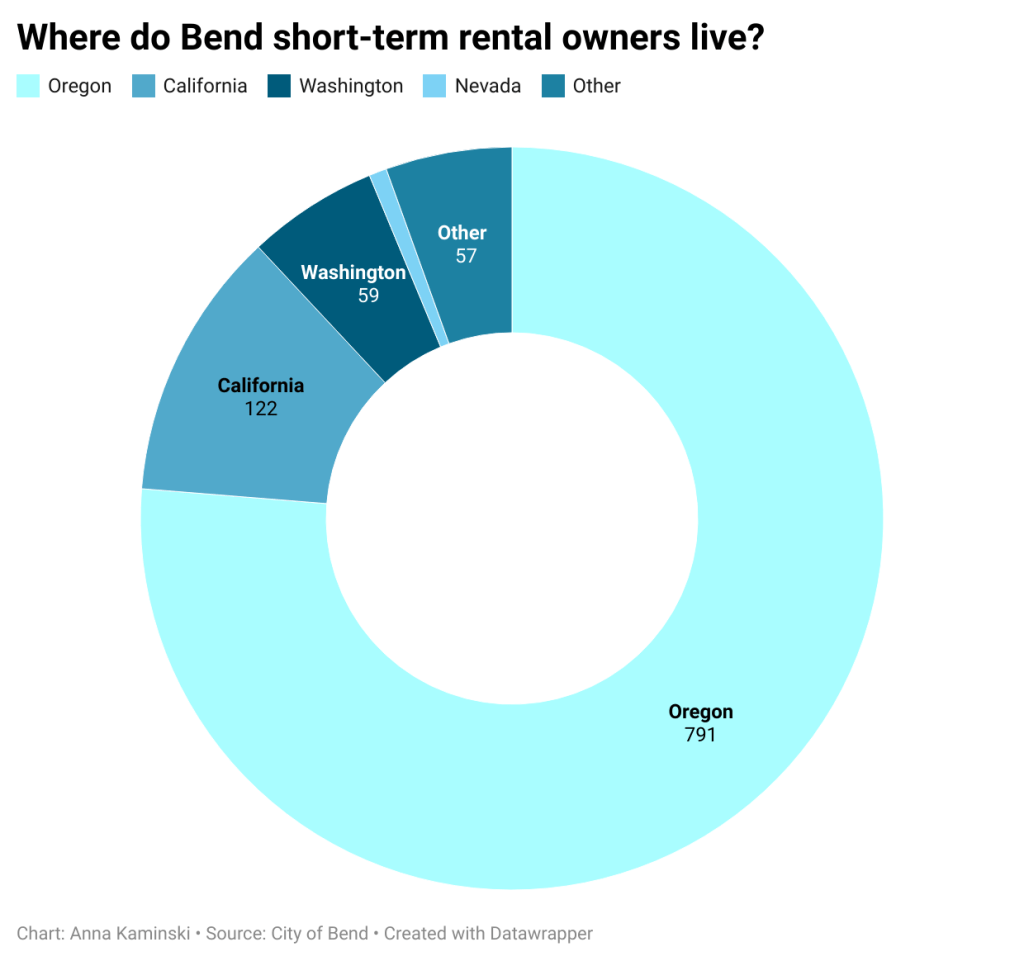Bend has very few unlicensed short term rentals, new audit shows
Published 6:30 pm Monday, April 17, 2023

- Where short-term rental owners live
The problem of unlicensed short-term rentals in Bend isn’t as pervasive as community members initially thought, a new compliance audit from the city shows.
More than a year ago, a Bend resident told the City Council that short-term rentals may be contributing to the current housing crisis. But there was no way to really know without an audit, in part because the city relies primarily on community complaints to identify illegal short-term rentals, said Lorelei Williams, the city’s licensing program manager.
The audit, which took place over several months this winter, reviewed 1,081 short-term rental listings from the summer of 2022, and found only 300 were worthy of investigation. Roughly 115 of those were actually long-term rentals because they were occupied for more than 30 consecutive days, and around 125 listings weren’t advertising any longer during the time of investigation.
That left only nine potentially illegal short-term rental properties in Bend, the audit results found.
This meant the city’s complaint-driven system has been working as intended, Williams said.
The short-term rental market generally slows down during winter months — usually by 10 to 15%, which can prompt people to pull their homes from the market, said Kevney Dugan, the chief executive of the city’s tourism arm Visit Bend.
Short-term rentals make up around 2% of Bend’s total housing stock, Dugan said. That’s around 1,200 short term rentals to Bend’s more than 46,000 housing units. In other places, like South Lake Tahoe, short term rentals make up around 25% of the total housing inventory, he said.
“We also have to recognize that on an annual basis, that that 2% of inventory also generates $3 million to $4 million in transient room tax,” Dugan said.
It’s not so much the number of short-term rentals that matter but the impact of those rentals on the local economy, said Dallas Fridley, a state economist. Plus, the beauty and desirability of places like Bend complicate things, he said.
Currently, there are more than 1,230 active short-term rentals within Bend’s city limits, according to data from the city. That number doesn’t include short-term rentals in Sunriver, Redmond or rural Deschutes County.
The Bend City Council unanimously approved stricter rules for short-term rentals in October, extending the buffer zone around existing rentals from 250 feet to 500 feet to reduce high concentrations of vacation rentals in some neighborhoods. The new rules make it easier for short-term rental owners to use their property for long-term leases.
However, the market tends to favor short-term leasing as much more lucrative, so business hasn’t been appealing for long-term landlords lately, said Tyler Neese with the Central Oregon Association of Realtors.
“It represents a lot less risk. I think, unfortunately, we’ve created an environment in which we’ve disincentivized long-term rentals,” Neese said.
The changes were meant to “reduce regulatory barriers for housing development” in order to encourage affordable housing for Bend’s low- and middle-income residents, the city said in an October news release.
But Fridley questioned whether the changes could be perceived as conflicting government policy, especially given the amount of second homes in desirable
destination towns like Bend, he said.
In Bend, there are an estimated 2,014 homes used solely for seasonal, recreational or occasional use, which is almost double the amount of short-term rentals, according to a 5-year estimate from the U.S. Census Bureau’s 2021 American Community Survey.
“I know the government is serious about attacking this issue, but at the same time, you’re still able to deduct mortgage on two homes. So there are some conflicting government policies out there that seem to be working against one another — or could be potentially. Particularly in the case where somebody owns two homes and only lives in one of them for part of the year,” Fridley said.
However, unregulated short-term rentals tend to erode the pool of available rental properties while driving up the cost of rent, Fridley said.
Tamara Houston was the one who initially brought up concerns about short-term rentals publicly to the Bend City Council in 2021. As a Bend native, she said she has seen firsthand how vacation rentals marketed to tourists have priced out working locals like teachers, nurses and grocery store employees. In particular, she is concerned about multiunit housing and single-family units that were once starter homes turning into vacation rentals.
She thinks the rules for short-term rentals ought to be stricter. Bend could follow the footsteps of other desirable mountain towns by changing the definition of short-term stays and prohibiting multifamily homes from qualifying for short-term rental permits, Houston said.
“This is making a difference in our affordable housing,” she said.
The Bend City Council could soon offer direction on potential proactive enforcement for short-term rentals, which could include third-party software monitoring, code changes or regular compliance audits, an internal memo from the city said.








